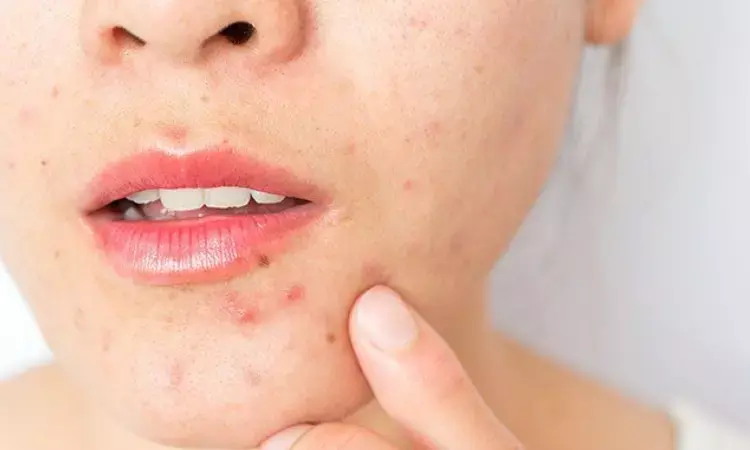- Home
- Medical news & Guidelines
- Anesthesiology
- Cardiology and CTVS
- Critical Care
- Dentistry
- Dermatology
- Diabetes and Endocrinology
- ENT
- Gastroenterology
- Medicine
- Nephrology
- Neurology
- Obstretics-Gynaecology
- Oncology
- Ophthalmology
- Orthopaedics
- Pediatrics-Neonatology
- Psychiatry
- Pulmonology
- Radiology
- Surgery
- Urology
- Laboratory Medicine
- Diet
- Nursing
- Paramedical
- Physiotherapy
- Health news
- Fact Check
- Bone Health Fact Check
- Brain Health Fact Check
- Cancer Related Fact Check
- Child Care Fact Check
- Dental and oral health fact check
- Diabetes and metabolic health fact check
- Diet and Nutrition Fact Check
- Eye and ENT Care Fact Check
- Fitness fact check
- Gut health fact check
- Heart health fact check
- Kidney health fact check
- Medical education fact check
- Men's health fact check
- Respiratory fact check
- Skin and hair care fact check
- Vaccine and Immunization fact check
- Women's health fact check
- AYUSH
- State News
- Andaman and Nicobar Islands
- Andhra Pradesh
- Arunachal Pradesh
- Assam
- Bihar
- Chandigarh
- Chattisgarh
- Dadra and Nagar Haveli
- Daman and Diu
- Delhi
- Goa
- Gujarat
- Haryana
- Himachal Pradesh
- Jammu & Kashmir
- Jharkhand
- Karnataka
- Kerala
- Ladakh
- Lakshadweep
- Madhya Pradesh
- Maharashtra
- Manipur
- Meghalaya
- Mizoram
- Nagaland
- Odisha
- Puducherry
- Punjab
- Rajasthan
- Sikkim
- Tamil Nadu
- Telangana
- Tripura
- Uttar Pradesh
- Uttrakhand
- West Bengal
- Medical Education
- Industry
Low levels of vitamin D linked to development of acne, study finds

Nepal: A new study in the Journal of Cosmetic Dermatology has found vitamin D to be low in patients with moderate-to-severe acne compared to control. Further, short-term therapy with oral isotretinoin did not seem to modify vitamin D levels.
Vitamin D may have a crucial role in the pathogenesis of acne vulgaris (AV) owing to its immunomodulatory effect and regulating the proliferation and differentiation of keratinocytes. Oral isotretinoin used for managing moderate-to-severe acne binds to the retinoid receptor, forming a heterodimer with the vitamin D receptor (VDR) and reducing vitamin D levels by increasing catabolism. So far, only two studies have investigated the effect of oral isotretinoin on serum vitamin D levels and have yielded contradictory results.
Against the above background, Samir Shrestha, Department of Dermatology and Venereology, B.P. Koirala Institute of Health Sciences, Dharan, Nepal, and colleagues aimed to compare the serum vitamin D levels in patients with moderate-to-severe acne and age- and sex-matched healthy controls and to determine the serum level of vitamin D in patients with moderate-to-severe acne after 3 months of oral isotretinoin treatment.
For this purpose, the study enrolled a total of 120 patients with moderate-to-severe acne and 90 age- and sex-matched healthy controls. Patients were treated with oral isotretinoin at 0.50–0.75 mg/kg/day and measurements of vitamin D were done at baseline and 3 months after the treatment.
Key findings include:
- Serum vitamin D was insufficient and deficient in 90.50% of cases in comparison with 43.33% of controls.
- Serum vitamin D had an inverse correlation with the severity of acne.
- Following 3 months of oral isotretinoin, there was no significant change in serum vitamin D level.
"In patients with moderate-to-severe acne, vitamin D was low compared with control. Vitamin D level did not change with short-term therapy with oral Isotretinoin," the researchers wrote in their study.
Reference:
Shrestha S, Agrawal S, Lamsal M. Vitamin D level in patients with moderate-to-severe acne: A case-control study combined with prospective study following oral isotretinoin treatment. J Cosmet Dermatol. 2022 Apr 16. doi: 10.1111/jocd.14996. Epub ahead of print. PMID: 35429216.
Dr Kamal Kant Kohli-MBBS, DTCD- a chest specialist with more than 30 years of practice and a flair for writing clinical articles, Dr Kamal Kant Kohli joined Medical Dialogues as a Chief Editor of Medical News. Besides writing articles, as an editor, he proofreads and verifies all the medical content published on Medical Dialogues including those coming from journals, studies,medical conferences,guidelines etc. Email: drkohli@medicaldialogues.in. Contact no. 011-43720751


